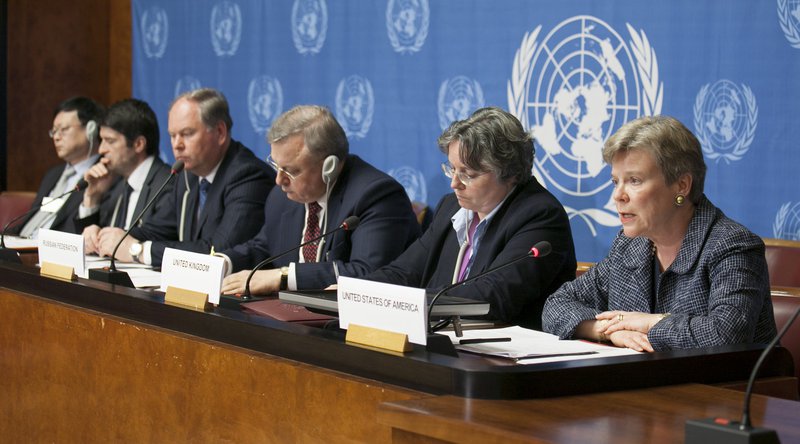
[Former] Acting Under Secretary of State for Arms Control and International Security, Rose Gottemoeller, speaks at a press conference hosted by the five nuclear weapon states under the Nuclear Non-Proliferation Treaty in 2013. Courtesy U.S. Mission Geneva
May 23, 2019
Elena Souris wrote for the Washington Post on how homogeneity in the nuclear security field impedes policy innovation.
Although they may not have been prominent at the Trump-Kim negotiation, women have been integral to the nuclear diplomacy field from the beginning. Female scientists in the Manhattan Project held a range of positions, including physicists, chemists and phlebotomists, working with male researchers to study plutonium and troubleshoot nuclear reactors. As the nuclear arsenal expanded, so did the number of women working as translators, counsels and senior policy and national security advisers. Beginning in the 1970s, women served as under, assistant and deputy secretaries, and starting in 1993, as Cabinet-level secretaries in the State, Defense and Energy departments.
Yet, of everyone in a senior nuclear policy position in the U.S. government since the 1970s, including in an acting capacity, only 12 percent were women, 2 percent of whom were women of color. Even as women advanced on the diplomatic stage, structural and cultural barriers limited their opportunities and contributions. Until 1972, married women in the Foreign Service had to resign. Only in 1976 did military service academies admit women. In 1968 and 1976, Foreign Service officer Alison Palmer sued the State Department for gender discrimination. At that time, women received downgraded awards and performance reviews that mentioned gender and marital status, were typically assigned to consular work and “disproportionately [were] refused assignments as deputy chief of mission.”
Ideas about power — who has it and who doesn’t — also constrained women. Culturally, “male” traits, like speed, decisiveness and aggression, became seen as markers of successful power politics, instead of “feminine” traits such as deliberation, collaboration and negotiation. During the Cuban missile crisis, President John F. Kennedy’s assistant secretary of defense called his commander in chief a “pantywaist” for his caution. Military power has often had a quite literal connection to manhood: According to his United Nations ambassador, President Lyndon B. Johnson once pulled out his “organ” and cited it as the reason for involvement in Vietnam. These ideas continued into the 1980s, when suggesting restraint after a nuclear attack made someone a “wimp.”